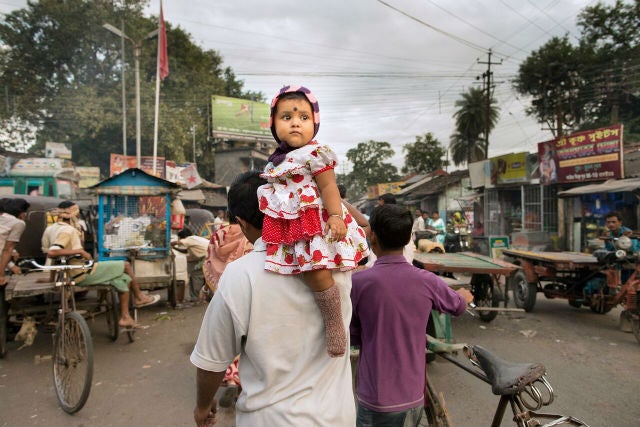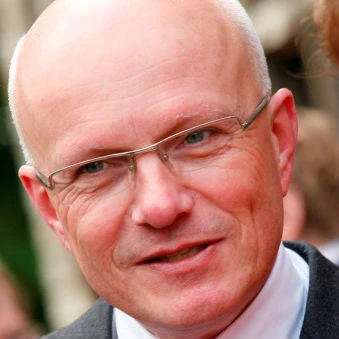
Ed’s note: This guest blog is by Dirk Wouters, Ambassador of the Kingdom of Belgium to the United States of America in Washington DC
A Kenyan mother seated in the hallway of a hospital, holding a newborn. She looks troubled, the baby has one thin arm up in the air. An Indian mother is resting after giving birth to twin girls. She already has two daughters at home. A Cambodian family looks to the future with hope as they take their newborn child back to their village. Nine babies, wrapped in colorful blankets, have been placed on a hospital bed in Kenya’s Pumwani hospital just after their birth. In this hospital, a 100 children are born every day.
These are just a few examples of the pictures from Lieve Blancquaert’s “Birth Day” series that the World Bank Group exhibited this month in the central atrium of the main complex in Washington DC to celebrate Universal Children’s Day. With “Birth Day,” Blancquaert sheds light on the conditions in which women give birth around the world, bringing into focus in a unique way inequalities of access to healthcare, gender issues, and extreme poverty.
As the Ambassador of Belgium to the United States, I am proud that it is a Belgian artist who provided us with these intimate pictures. Blancquaert works not only with the highest aesthetical standards, but also seeks social relevance. Belgium has a history of outstanding contribution in the field of visual arts and this tradition is very much alive today. What better place for arts as when they call our attention to the challenges of our days?
Looking at these images, we realize that, even if we are all born the same way, everything changes as soon as we emit our first breath. 364,501 times a day, somewhere on earth a new life begins, and with it a new story, a powerful story, a difficult story, a story of freedom, a story of resilience, accomplishment or poverty? That is up to us.
With this exhibition we celebrated not only Universal Children’s Day but also the efforts of the World Bank Group, the Global Financing Facility (GFF), and other partners to promote the importance of investing in the early years.
Belgian development cooperation proudly supports this agenda, which encompasses education, reproductive health, and children’s rights. This is about real people in challenging situations. Just to give you one example, I would like to recall a story reported in our Globe-newsletter by Belgian NGO Memisa which particularly struck me. They followed three women: Robana, Ngemenki and Elodie on their way to a field hospital in the Democratic Republic of Congo. These courageous women have to give birth to their children after walking for hours, enduring an unbelievable journey by boat and by bicycle. We should be able to bring health services closer to their villages, to help provide better labor and delivery conditions, and we should be able to continue our support through the early years.
Belgium’s development cooperation has a deep expertise in health care, including mother and child care during pregnancy and birth. For instance, Mono-Couffo, a region of Benin, recently received an important maternity equipment upgrade, together with a long term health support program including training, research, and monitoring of care levels. In Benin, about 1,400 women die every year due to pregnancy complications. We want to significantly reduce this alarming figure by supporting the efforts of Beninese health workers.
Back in Belgium, in Ghent, the Centre for Innovation in the Early Years (VBJK) participates in broad European research on inclusive education and professional approach to early childcare. Their research proves that investing in quality care can make a dramatic difference for children in vulnerable situations (for instance children of migrants and refugees). Children benefiting from quality childcare are more likely to feel accepted and respected, and their linguistic and social skills improve. The benefits are felt by the whole family, as a positive effect on parenting can be measured.
These two examples make clear that investing in the early years is one of the smartest things a country can do to eliminate extreme poverty, boost shared prosperity, and create the human capital needed for economies to diversify and grow. Newborn children will be youngsters within years. They need a perspective, education, self-esteem, jobs, agency, in order to be able to contribute, when their time comes, to make their world a better place.
Indeed, the World Bank, GFF, and other partners provide us with the evidence that this works: investing in the early years can yield returns of 15 to 25% in economic output. Investment in early childhood education, nutrition, health, and protection is crucially important for later development and will contribute to human capital, to growth, to prosperity.
That doesn’t mean scaling up the efforts in support of early childhood development is an easy task. But it is within our grasp. There is a role for parents, for teachers, health workers, local institutions, academics and practitioners, and bilateral and multilateral donors in this endeavor. It is likewise essential that we provide our assistance in a coordinated way. I would like to invite all stakeholders to continue and deepen the partnerships and opportunities for collaboration in this area, because no single partner will be able to meet the challenges on its own.
Get updates on the World Bank Group’s work on education on Twitter and Flipboard.
See resources on early childhood development here.


Join the Conversation